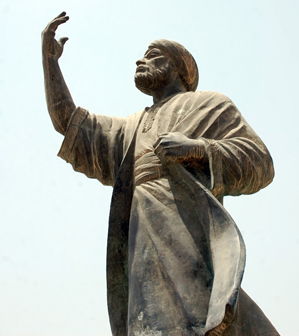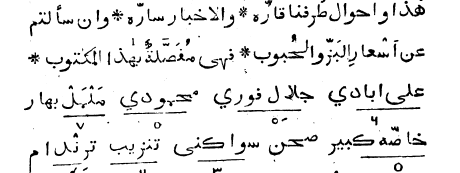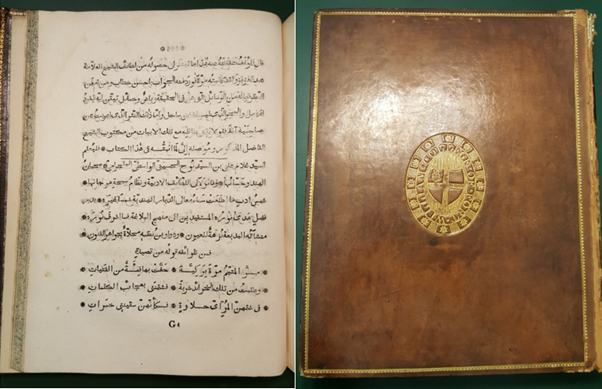The collected poems of al-Mutanabbi (d. 965), the most celebrated Arabic poet ever, were first printed not in Cairo or Beirut, but Calcutta in 1815.
The editor, Shaykh Ahmad, was Yemeni. But maybe he was also Georgian? Where did he "really come from" and why did it matter?
1/13
The editor, Shaykh Ahmad, was Yemeni. But maybe he was also Georgian? Where did he "really come from" and why did it matter?
1/13
Shaykh Ahmad grew up in al-Hudaydah in Yemen before crossing the Indian Ocean, making a series of trips before settling in India around 1812. He travelled for trade – as letters to his family show – but he also travelled with eloquence and Arabic poetry in hand.
2/13
2/13
He became famous in Calcutta as an Arabic scholar by editing important texts for print at the East India Company’s Fort William College plus his own enduringly popular anthologies of poetry & adab. He also travelled extensively and won patronage in Lucknow & Bhopal
3/13
3/13
During his lifetime & after, he was mostly known as a Yemeni. Yemen was his birthplace, and he felt nostalgic for it. One of his anthologies (which also became a British “class book” for learning Arabic) was called “Breezes from Yemen carrying memories to dispel heartache”
4/13
4/13
But of course he didn’t just come from one place. Like many others he had multiple belongings. His fuller name was Ahmad al-Ansari al-Yamanī al-Shirwani - so he claimed descent from the early Islamic community, was Yemeni, & also had origins in Shirvan near the Caspian Sea
5/13
5/13
It turns out his paternal family had lived in Iran for several generations and fled the turmoil at Nadir Shah’s Court in around 1747. Shaykh Ahmad’s father travelled to Shirvan and then to Yemen – so Shaykh Ahmad was the first generation of his family born in Yemen.
6/13
6/13
Shaykh Ahmad’s father also dropped his old “Mirza” title that showed he was an Iranian gentleman and become a “Shaykh” – this must have bolstered his Arab credentials & marked him as an Arab trader in India. His own brother remained a Mirza and found success in India too!
7/13
7/13
So Shaykh Ahmad came to India as a Yemeni. But a bitter rival Jawad/Nathaniel Sabat – who liked annoying both Muslims & Christian Missionaries in Calcutta - disparagingly called him “Georgian” (i.e. the Shirwan connection) – clearly to challenge his Arab credentials
8/13
8/13
The British meanwhile were proud to have a “native of Arabia” teaching and editing works at Fort William. "Native" was a newly developing Orientalist concept to explain origins, language, and land. It doesn’t really do justice to Shaykh Ahmad’s complex background.
9/13
9/13
Where does this leave us? It’s tempting to think that belonging & identity before the nation state were much freer or borderless. But origins and belonging (particularly for elite men!) might be celebrated, contested, even forgotten.
Check out Mana Kia& #39;s new book on this!
10/13
Check out Mana Kia& #39;s new book on this!
10/13
And compare Shaykh Ahmad with this: As @yarbal_ pointed out, the renowned scholar Murtaza Zabidi was from Bilgram, but may have "forgotten" his Indian origins to become Yemeni.
https://twitter.com/yarbal_/status/1293166462463438854
11/13">https://twitter.com/yarbal_/s...
https://twitter.com/yarbal_/status/1293166462463438854
11/13">https://twitter.com/yarbal_/s...
Sources:
Ahmed Al-Mesri’s thesis on Shaykh Ahmad: https://www.tib.eu/en/search/id/TIBKAT%3A859985490/A%E1%B8%A5mad-Ibn-Mu%E1%B8%A5ammad-al-Shirw%C4%81n%C4%AB-al-Yam%C4%81n%C4%AB-1200-1256AH/
Bio">https://www.tib.eu/en/search... of Shaykh Ahmad in Subh-i Gulshan p. 180: https://babel.hathitrust.org/cgi/pt?id=njp.32101077699088&view=1up&seq=1
Annals">https://babel.hathitrust.org/cgi/pt... of Fort William (w/ appendix of works printed there): https://archive.org/details/annalscollegefo00roebgoog
Book">https://archive.org/details/a... on Jawad Sabat: https://archive.org/stream/in.ernet.dli.2015.38628/2015.38628.Life-And-Work-Of-Jawad-Sabat
12/13">https://archive.org/stream/in...
Ahmed Al-Mesri’s thesis on Shaykh Ahmad: https://www.tib.eu/en/search/id/TIBKAT%3A859985490/A%E1%B8%A5mad-Ibn-Mu%E1%B8%A5ammad-al-Shirw%C4%81n%C4%AB-al-Yam%C4%81n%C4%AB-1200-1256AH/
Bio">https://www.tib.eu/en/search... of Shaykh Ahmad in Subh-i Gulshan p. 180: https://babel.hathitrust.org/cgi/pt?id=njp.32101077699088&view=1up&seq=1
Annals">https://babel.hathitrust.org/cgi/pt... of Fort William (w/ appendix of works printed there): https://archive.org/details/annalscollegefo00roebgoog
Book">https://archive.org/details/a... on Jawad Sabat: https://archive.org/stream/in.ernet.dli.2015.38628/2015.38628.Life-And-Work-Of-Jawad-Sabat
12/13">https://archive.org/stream/in...
~SL
Because of my foggy head in the hot and humid weather, I will probably do just one more thread as a guest Tweetistorian! Give me a follow on my normal account @_SimonLeese
#Twitteristorian #Twitterhistorians
13/13
Because of my foggy head in the hot and humid weather, I will probably do just one more thread as a guest Tweetistorian! Give me a follow on my normal account @_SimonLeese
#Twitteristorian #Twitterhistorians
13/13

 Read on Twitter
Read on Twitter









